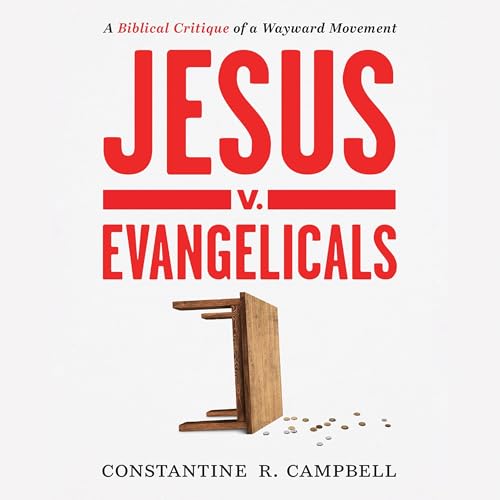
Jesus v. Evangelicals
A Biblical Critique of a Wayward Movement
No se pudo agregar al carrito
Add to Cart failed.
Error al Agregar a Lista de Deseos.
Error al eliminar de la lista de deseos.
Error al añadir a tu biblioteca
Error al seguir el podcast
Error al dejar de seguir el podcast
 Exclusivo para miembros Prime: ¿Nuevo en Audible? Obtén 2 audiolibros gratis con tu prueba.
Exclusivo para miembros Prime: ¿Nuevo en Audible? Obtén 2 audiolibros gratis con tu prueba.Compra ahora por $20.69
-
Narrado por:
-
John Behrens
American evangelicalism is at a crisis point.
The naked grasping at political power at the expense of moral credibility has revealed a movement in disarray. Evangelicals are now faced with a quandary: will they double-down and continue along this perilous path, or will they stop, reflect, and change course? And while support of Donald Trump has produced the tipping point of the evangelical crisis, it is not by any means its only problem.
Evangelicals claim the Bible as the supreme authority in matters of faith. But in reality, it is particular readings of the Bible that govern evangelical faith. Some evangelical readings of the Bible can be highly selective. They distort the Bible's teaching in crucial ways and often lead evangelicals to misguided attempts to relate to the world around them. Many Christians who once self-professed as "evangelicals" can no longer use the term of themselves because of what it has come to represent--power-mongering, divisiveness, judgementalism, hypocrisy, pride, greed. Some leave not just evangelicalism but Christianity for good.
Jesus v. Evangelicals is an insider's critique of the evangelical movement according to its own rules. Since evangelicals regard themselves governed by the Bible, biblical scholar Constantine Campbell engages the Bible to critique evangelicals and to call out the problems within the contemporary evangelical movement. By revealing evangelical distortions of the Bible, this book seeks to restore the dignity of the Christian faith and to renew public interest in Jesus, while calling evangelicals back to his teaching. Constantine Campbell appeals to evangelicals to break free from the grid that has distorted their understanding of the Bible and to restore public respect for Christianity in spite of its misrepresentations by the evangelical church.
Los oyentes también disfrutaron:




















Essential reading for Christians
Se ha producido un error. Vuelve a intentarlo dentro de unos minutos.
An Important Work
Se ha producido un error. Vuelve a intentarlo dentro de unos minutos.
A Needed Message
Se ha producido un error. Vuelve a intentarlo dentro de unos minutos.
Truthful, inspiring, rewarding
Se ha producido un error. Vuelve a intentarlo dentro de unos minutos.
Shines a spotlight on Evangelicalism’s devolution
Se ha producido un error. Vuelve a intentarlo dentro de unos minutos.


